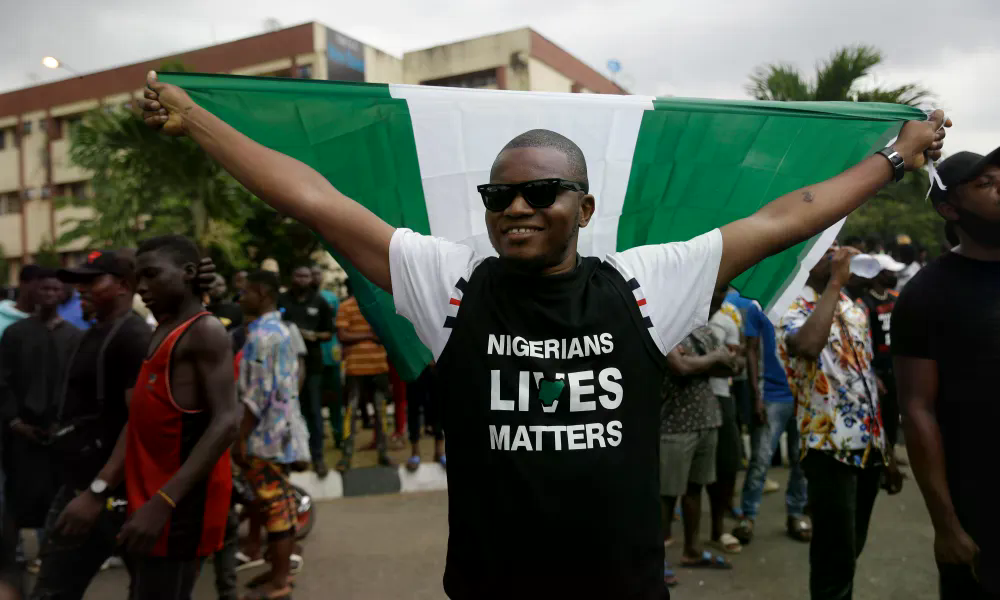
Lagos and Ogbomoso, Nigeria — Agbeze Ifeanyi Matthew was lying on the ground in fear as gunfire echoed around him, believing his city had turned into a battlefield. That night, hundreds of young protesters gathered at the Lekki tollgate in Lagos, waving green and white national flags and singing the national anthem.
Matthew felt a sharp impact to his chest, followed by a stream of warm liquid. He looked down and realized he had been shot, with the bullet entering through his chest and exiting through his back. He tried to run but collapsed, losing consciousness. Fellow protesters carried him to General Hospital, where he received treatment before being transferred to another facility.
“I had lost a lot of blood because there were two openings. While I was being treated, I could hear the doctors and nurses talking, but I couldn’t react or open my eyes,” Matthew told Al Jazeera. “I thought I was going to die.”
The bullet fractured two ribs, but Matthew survived. On October 20, 2020, 48 people were injured, including a dozen who died, after Nigeria’s military opened fire on unarmed demonstrators during what became known as the Lekki massacre.
Five years ago, thousands of young Nigerians, including Matthew, participated in the #EndSARS protests, a nationwide demonstration against the Special Anti-Robbery Squad (SARS), which was accused of harassment, rape, extortion, and other crimes. Matthew joined the protests because he claimed he had been regularly profiled and harassed by SARS officers during his commutes in Lagos.
After years of complaints and perceived impunity, demonstrators took to the streets to demand the disbandment of the SARS unit, police reforms, and better governance. However, their peaceful protests were met with violent responses from security forces, starting with tear gas and water cannons, and eventually escalating to live ammunition.
Despite promises of justice and the establishment of inquiry panels, many Nigerians say that accountability has not been achieved. Anietie Ewang, a researcher at Human Rights Watch, noted that Nigeria tends to move on quickly from such events, reflecting both the impunity within its security forces and the failure of its justice system.
Matthew spent the day after the shooting in the hospital, receiving care from his siblings and protest organizers. He described seeing others brought in from the protest site, some of whom died while being treated. He considered it a miracle that he survived.
The following day, Lagos Governor Babajide Sanwo-Olu visited the hospital and stated that the order to shoot protesters came from “forces beyond our direct control.” He promised to cover the victims’ medical expenses, which Matthew did not have to pay.
However, after being discharged, Matthew struggled to recover. Protesters raised money for an X-ray, which revealed that his ribs were colliding, causing ongoing pain. He has yet to receive the necessary surgery due to financial constraints. He remains in pain and frustration, feeling that justice has not been served, no one has been charged, and neither the military nor the government has taken responsibility.
Several states established panels of inquiry to address compensation for victims of SARS-related abuses and security force violations during the protests. Lagos State paid at least 410 million naira ($279,000) in compensation to 70 victims and families, while other states also made payments.
Temitope Ajayi, senior special assistant to the president on media and publicity, stated that the federal government had no role in seeking justice for the victims. He said that the states set up investigative panels, with Lagos being the epicenter of the protests.
Al Jazeera attempted to contact the Lagos state government spokesperson and Lagos police for comment but did not receive a response.
Matthew’s experience is one of many across Nigeria. In Ogbomoso, Oyo State, the family of Jimoh Isiaka, the first person killed in the 2020 protests, continues to grieve. His father, Jimoh Atanda, recalled the moment he learned of his son’s death and the subsequent lack of justice or compensation.
Over four months, Atanda attended multiple inquiry panels, but none of the promises were fulfilled. The police involved in his son’s death remain free, and the family has not received any financial support.
HRW’s Ewang noted that many promises made after the protests were largely symbolic, with little follow-up. She emphasized the need for continued pressure from society to ensure accountability.
Adewunmi Emoruwa, global policy lead at Gatefield, highlighted the systemic failures that allowed the violence to occur and hindered justice. He described the #EndSARS movement as a rare moment of unity in a divided nation, but also as a source of disillusionment for many.
Despite the disbandment of SARS, many Nigerians believe that police abuse has not ceased. Emoruwa argued that true justice requires legal accountability, institutional reform, and collective truth-telling.
Meanwhile, in Ikorodu, Matthew continues to struggle with the aftermath of the violence. His father died shortly after learning of his son’s injury, and he lost his job at a gas company. As another October approaches, he fears the trauma will resurface.
“I thank God for my life,” Matthew said, “even though I am still in pain and have no money to go for the surgery.”


